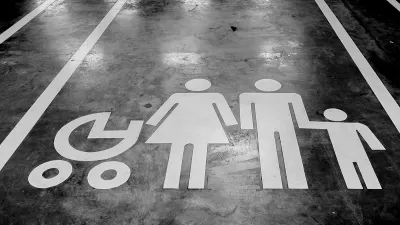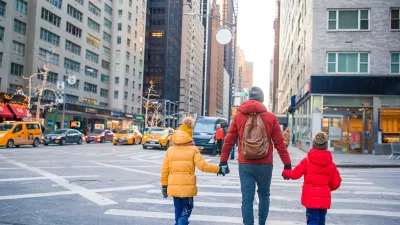There's a new volley in the long-running battle between cities and suburbs. In his new book "The Human City," urban scholar Joel Kotkin contends that cities and their planners have lost sight of the residents who matter most: families.

"Kotkin has long been a contrarian and critic of contemporary planning — sometimes a perceptive and welcome one, especially when urbanists, myself included, have gotten too cute or too smug. 'The Human City' is probably his most comprehensive critique and surely his most off-putting."
"The 'us' in Kotkin’s divisive title refers to nuclear families: husbands and wives who dutifully bear sons and daughters. They are, claims Kotkin, the ones whom cities ought to serve. They have no use for monumental statements like towers and superblocks nor for fripperies like parklets, bike lanes, street festivals, and loft conversions. And they certainly don’t want their children having to share personal space with 'them,' whoever 'they' may be."
"In asserting the preferences of some 122 million people (including many children who probably had no say in the matter), Kotkin makes no effort to distinguish desire from resignation. The status quo does not tell us whether they 'want' to live in suburbs or whether they are merely willing to do so because that’s where most housing units have been built over the last century."
"Planners in center cities focus on downtowns, multifamily housing, commercial pockets, and certain amenities because, well, that’s what they have to work with. Density is what a city is – especially 'luxury cities.' Being for or against density is a silly question. Managing density and making it work, for families and everyone else, is the real question."
FULL STORY: Fetishizing Families: Review of 'The Human City'

Planetizen Federal Action Tracker
A weekly monitor of how Trump’s orders and actions are impacting planners and planning in America.

Congressman Proposes Bill to Rename DC Metro “Trump Train”
The Make Autorail Great Again Act would withhold federal funding to the system until the Washington Metropolitan Area Transit Authority (WMATA), rebrands as the Washington Metropolitan Authority for Greater Access (WMAGA).

The Simple Legislative Tool Transforming Vacant Downtowns
In California, Michigan and Georgia, an easy win is bringing dollars — and delight — back to city centers.

The States Losing Rural Delivery Rooms at an Alarming Pace
In some states, as few as 9% of rural hospitals still deliver babies. As a result, rising pre-term births, no adequate pre-term care and "harrowing" close calls are a growing reality.

The Small South Asian Republic Going all in on EVs
Thanks to one simple policy change less than five years ago, 65% of new cars in this Himalayan country are now electric.

DC Backpedals on Bike Lane Protection, Swaps Barriers for Paint
Citing aesthetic concerns, the city is removing the concrete barriers and flexposts that once separated Arizona Avenue cyclists from motor vehicles.
Urban Design for Planners 1: Software Tools
This six-course series explores essential urban design concepts using open source software and equips planners with the tools they need to participate fully in the urban design process.
Planning for Universal Design
Learn the tools for implementing Universal Design in planning regulations.
Smith Gee Studio
City of Charlotte
City of Camden Redevelopment Agency
City of Astoria
Transportation Research & Education Center (TREC) at Portland State University
US High Speed Rail Association
City of Camden Redevelopment Agency
Municipality of Princeton (NJ)





























